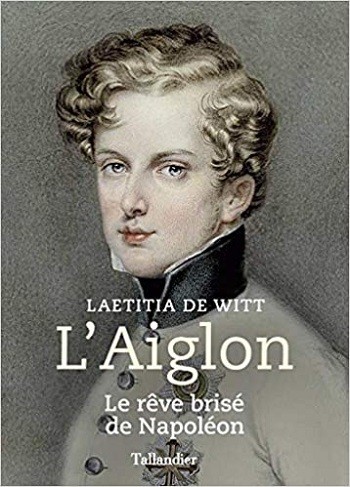napoleon.org – Your research on the son of Napoleon I has taken you to archives across Europe, from Paris to Vienna. In terms of sources, what was the greatest difficulty you faced getting to the “real” story?
Laetitia de Witt – My research began naturally in Paris, at the French National Archives. Some of the writings of Napoleon’s son (who became the Duc de Reichstadt) are kept there, but these are mainly school assignments and drafts of letters and other documents. It was there that I first came face-to-face with the duke’s handwriting. But there’s nothing there of significance in terms of what he actually thought about things. Nor did my visit to the archives in Vienna reveal much more in that regard. On the other hand, I did find some very interesting material there related to his position at the Austrian court and his military life. While most of the documents were in French, there were some in Gothic German script that were very hard to decipher. But this was not the main problem. The complexity of the character comes from the way his actual life is enmeshed with the legend.
Throughout his short life, the Duc de Reichstadt was, politically speaking, the living embodiment of the remembrance of Napoleon. His existence therefore aroused fear in some people and hope in others. His supporters were quick to denounce Metternich’s Machiavellianism whereby he managed to transform the heir to the Empire into a mere Austrian prince. This state of affairs gave rise to the image of the “prisoner of Vienna”, a counterpoint to that of Napoleon on St Helena. Austria, for its part, refused to assume the role of jailer and projected the image of a prince of impeccable education, much cherished by his grandfather. The manuscript department of the Bibliothèque Nationale [the French National Library] preserves the letters written by Moritz, Prince of Dietrichstein, the Duke’s tutor, to Marie-Louise and her second husband, Adam Albert, Count von Neipperg. This is an exceedingly valuable source for those interested in Napoleon’s son, but it is difficult to interpret, given the jousting for influence over the child that suggests (reading between the lines) that there were many things left unsaid. How could Marie-Louise, herself entangled in an complicated marital situation, not be uneasy at the evocation of a son who was a source of embarrassment for her?
In short, the material available to the researcher is full of undertones that are not always easy to decipher and that contribute to the aura of mystery that surround this character. Ultimately, it is perhaps preferable, out of a sort of respect for the memory of the Duc de Reichstadt, not to try to reveal the secret of his soul, so much did he, by sheer force of will, conceal what he really thought.
napoleon.org – You were born into the Bonaparte family and so you’ve lived with the history of the Aiglon and his sentimental importance since you were young. Did you find it odd to be writing a serious history book about him and his destiny?
Laetitia de Witt – Shortly before his death, the Duc de Reichstadt himself gave the famous resumé of his own existence: “My birth and my death, there is the whole of my history. Between my cradle and my grave is just one great nothing”. Despite receiving the title Napoleon II for a few days in 1815, no important decisions were taken during his momentary reign – not surprising really, since he was not in Paris at the time and was only four years old. After that, he never seems to have tried to impose his will, at least no attempts or plans are known. From this vain political existence came the idea that, politically speaking, he lacked decisiveness. Now, nothing could be further from the truth.
I had never realised before how his entire life was a reaction to political calculations, starting of course with his birth that, anchored as it was in the time of the Empire, was designed to transform the status of this State from “exceptional” to “perennial”. After that, I knew that he was thought to represent a threat to the European equilibrium, but I had never fully taken on board how seriously the possibility of his return to the French throne was taken, particularly by the monarchists. It is extraordinary to see the major place he occupies in the diplomatic correspondence between France and Austria during the Restoration. One hundred and eight years after his death, in 1940, the accidents of history made him once again a figure of importance, this time between France and Nazi Germany.
On the centenary of the return of Napoleon I’s mortal remains to France, Hitler, fascinated by the figure of the Emperor, decided to repatriate the Emperor’s son’s body and have it interred at the Invalides. Though the Führer had hoped that this act would bring the French over to him, all it provoked in the end was intense political upheaval and the dismissal of Laval, on Friday 13 December 1940. This ‘Friday 13th’ unlucky charm for the collaborationist minister was almost like the Aiglon’s final political victory!
napoleon.org – You’ve now written on Prince Victor and on the Aiglon, both largely forgotten Napoleonids. Do you have other projects of this sort concerning the Imperial Family? Who’s the next one, do you think, who should be “brought back”?
Laetitia de Witt – I don’t have any specific projects at the moment, just lots of ideas and things I want to do, notably to work on a female figure. As for who should next be back in history’s spotlight, I think I would just say that history is full of men and women at first sight reduced to a sort of historical nullity but who nevertheless were first-hand witnesses to their times. Every life and destiny is interesting and mysterious.


